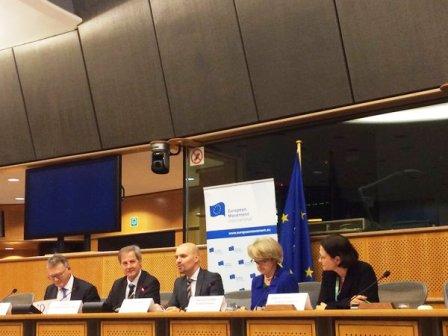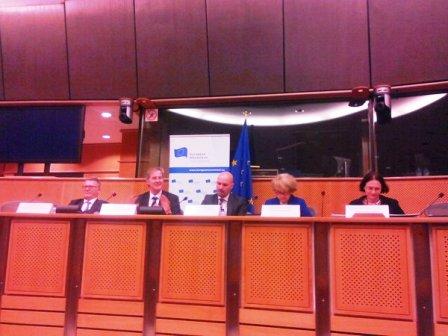The European Movement International organised an event on the European Parliament’s initiative to reform the Electoral Law of the EU.
The European Parliament’s Co-Rapporteurs (Danuta Hubner and Jo Leinen) were joined by the Luxembourgish Minister of Labour Nicolas Schmit, President of the Council of the European Union, as well as a representative of the DG Justice and Consumers, European Commission.
 Eventually, a proposal on electoral law reform, co-authored by Jo Leinen and Danuta Hübner, was endorsed by MEPs on Wednesday, 11 November. With the Report drafted by Jo Leinen (S&D), President of the European Movement International and Danuta Hübner (EPP), Chairwoman of AFCO Committee, the European Parliament is exercising its special right of legislative initiative for a reform of the European electoral law under Art. 223 (1) TFEU. The reform proposal inter alia builds on the new modus operandi for the election of the Commission President with lead candidates nominated by the European political parties and a strengthened role of the European Parliament. Putting forward concrete proposals for amending the 1976 Electoral Act as well as further recommendations, the report seeks to make the European Elections more transparent, more attractive and more European.
Eventually, a proposal on electoral law reform, co-authored by Jo Leinen and Danuta Hübner, was endorsed by MEPs on Wednesday, 11 November. With the Report drafted by Jo Leinen (S&D), President of the European Movement International and Danuta Hübner (EPP), Chairwoman of AFCO Committee, the European Parliament is exercising its special right of legislative initiative for a reform of the European electoral law under Art. 223 (1) TFEU. The reform proposal inter alia builds on the new modus operandi for the election of the Commission President with lead candidates nominated by the European political parties and a strengthened role of the European Parliament. Putting forward concrete proposals for amending the 1976 Electoral Act as well as further recommendations, the report seeks to make the European Elections more transparent, more attractive and more European.
A reform of the European electoral system and the rules governing the European parties includes the necessity to strengthen the link between parties and the EU citizens. The creation of a European constituency, more autonomy for the European political parties, making the affiliation of national parties with a European political party visible and increase the presence of European political parties are in the core of this initiative.
MEP Leinen started his intervention by underlying the need and the importance of a reform of the European electoral system in order to make elections more European promoting always the European democracy, the EU ideals and the EU citizenship. Thus, he referred to core issues of this proposal like the right to vote from the age of 16, the possibility of e-voting and the rule for mandatory thresholds. More precisely the MEP stated that they want to set an equal visibility of national parties, to make the young generation familiar with the European politics advocating a general 3 or 5 percent rule for mandatory thresholds. He expressed his hope of getting the legislation proposed, foreseeing the introduction of 16 years age limit and e-voting.
MEP Hübner began her contribution by referring to the vast criticism the EU law receives and the lack of trust of the EU citizens. She stressed out the importance of such a reform in terms of transparency and democracy. According to Ms Hübner Europe needs this change of electoral act in order to give Europeans the democratic procedure they deserve. She explained that we should have to the balance right on the electoral law and asked for additional safeguards to prevent the cases of double voting. By concluding, she said that strengthening the online voting would be a great way to increase the voting turnout.
In his view Mr Schmit emphasized it is now more than ever that we need a stronger movement in order to overcome the sensitivities of our political systems and pointed out that Europe should stay connected with young people. He congratulated the co-rapporteurs for this report and added that everything should be treated in a pragmatic way of the principles. On the e-voting aspect he placed himself in favour by stating that a digital revolution would give us tremendous possibility for democracy. Although he raised some difficult issues to be tackled of the report but we should not give up. Mr Schmit proposed to discuss this legislative procedure in a GAFC level due to its exceptional character. He wished good luck on the transnational lists and asked the EP to work very close together with the Council in order to get through the long process lying ahead.

The representative of the European Commission expressed the full support of the European Commission to this reform and its firm belief that this novelty will contribute to the increase of accountability, transparency, making citizens more aware, advancing the citizenship rights and creating a more direct link between the vote and the European dimension. Finally, she added that EC has already launched and online public consultation on this issue, while it is preparing its own report.
Spitzenkandidaten, the process that helped choosing the Commission President, was the success of the European elections 2014. MEPs now want to make this experiment official by amending EU electoral law. The text voted also foresees the introduction of mandatory thresholds and making it easier to vote from abroad. However no agreement was reached over strict parity on the lists or over lowering the voting age. It remains very interesting and uncertain how this report will be evolved, getting through the legislative procedures and the interests of the member states.
